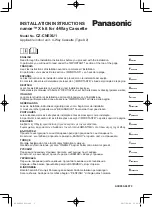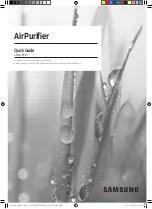
5120410-XIM-B-0216
Johnson Controls Unitary Products
53
Start-Up (Cooling)
Prestart Check List
After installation has been completed:
1.
Check the electrical supply voltage being supplied. Be sure
that it is the same as listed on the unit nameplate.
2.
Set the room thermostat to the off position.
3.
Turn unit electrical power on.
4.
Set the room thermostat fan switch to on.
5.
Check indoor blower rotation.
• If blower rotation is in the wrong direction. Refer to
Phasing Section in general information section.
Check blower drive belt tension.
6.
Check the unit supply air (CFM).
7.
Measure evaporator fan motor's amp draw.
8.
Set the room thermostat fan switch to off.
9.
Turn unit electrical power off.
Operating Instructions
1.
Turn unit electrical power on.
NOTE:
Prior to each cooling season, the crankcase heaters
must be energized at least 10 hours before the system
is put into operation.
2.
Set the room thermostat setting to lower than the room
temperature.
3.
First stage compressors will energize after the built-in time
delay (five minutes).
4.
The second stage of the thermostat will energize second
stage compressor if needed.
Post Start Check List
1.
Verify proper system pressures for both circuits.
2.
Measure the temperature drop across the evaporator coil.
Start-Up (Gas Heat)
Pre-Start Check List
Complete the following checks before starting the unit.
1.
Check the type of gas being supplied. Be sure that it is the
same as listed on the unit nameplate.
2.
Make sure that the vent outlet and combustion air inlet are
free of any debris or obstruction.
Operating Instructions
Lighting The Main Burners
1.
Turn “OFF” electric power to unit.
2.
Turn room thermostat to lowest setting.
3.
Turn gas valve counter-clockwise to “ON” position (See
Figure 30).
4.
Turn “ON” electric power to unit.
5.
If thermostat set temperature is above room temperature,
the main burners will ignite. If a second stage of heat is
called for, the main burners for second stage heat will
ignite for the second stage heat.
Post Start Checklist
After the entire control circuit has been energized and the
heating section is operating, make the following checks:
1.
Check for gas leaks in the unit piping as well as the supply
piping.
2.
Check for correct manifold gas pressures. (See CHECKING
GAS INPUT.)
3.
Check the supply gas pressure. It must be within the limits
shown on the rating nameplate. Supply pressure should be
checked with all gas appliances in the building at full fire. At
no time should the standby gas pressure exceed 10.5 in. or
the operating pressure drop below 4.5 in for natural gas
units. If gas pressure is outside these limits, contact the
local gas utility or propane supplier for corrective action.
Shut Down
1.
Set the thermostat to the lowest temperature setting.
2.
Turn “OFF” all electric power to unit.
3.
Open gas heat access panel.
4.
Turn gas valve clockwise to “OFF” position (See Figure 30).
Checking Gas Heat Input
This unit has two stages of gas heat. The first stage is 60% of
the full fire input and is considered the minimum input for the
furnace. The intended input for each furnace is shown in
Table 35. To determine the rate of gas flow (Second Stage).
1.
Turn off all other gas appliances connected to the gas
meter.
This furnace is equipped with an automatic re-ignition
system. DO NOT attempt to manually light the pilot.
FIRE OR EXPLOSION HAZARD
Failure to follow the safety warning exactly could result
in serious injury, death or property damage.
Never test for gas leaks with an open flame. use a
commercially available soap solution made specifically
for the detection of leaks to check all connections. A fire
or explosion may result causing property damage,
personal injury or loss of life.
















































